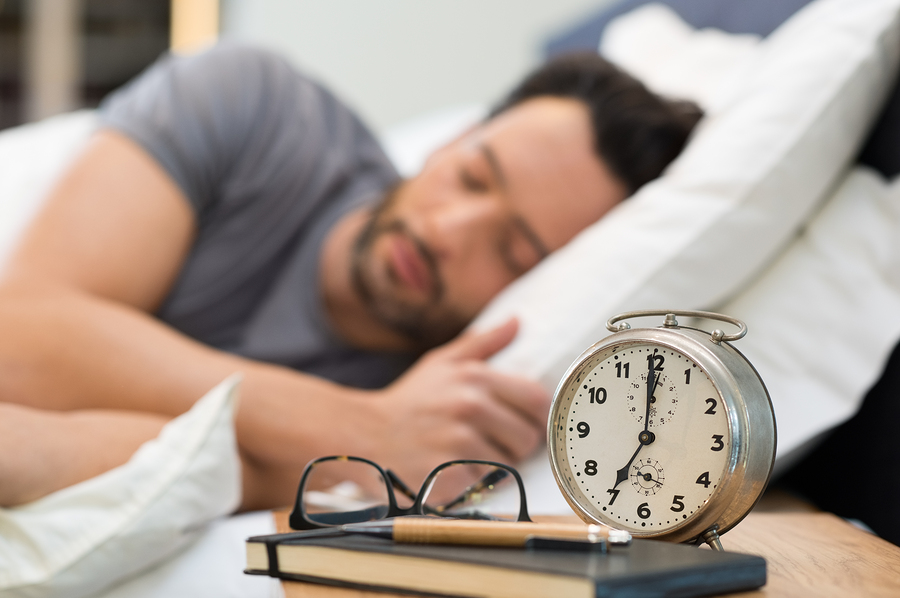- Make It Yourself Lavender Heart-Shaped Bath Bombs!
- 20 Things You Never Knew About “Down There”
- 12 Best Foods For Those Suffering From Arthritis Pain
- 12 Personal Hygiene Mistakes Almost Everyone Makes (Mom Never Told You About #4!)
- 15 Medicinal Plants And Herbs From The Cherokee People
- 12 Mind-Blowing Benefits Of Drinking Coconut Water During Pregnancy
- 12 Outstanding Winter Foods That Won’t Fatten You Up Like A Christmas Turkey
5 Most Efficient Routines To Follow To Get Rid Of Insomnia
To some, sleep might seem like an unnecessary action that just takes away from the time you have to get everything done in one day. It might seem that you can get by with just a few hours of sleep and be all right, that you can skip on sleep and be OK. More and more research is telling us that this is not the case though. Insufficient sleep seems to be connected to a host of problems in the body as well as mental illnesses such as dementia and Alzheimer’s.
There are a few processes that occur in your body while your body is sleeping and most of them have to happen on a regular basis for your body to function properly. First, a proper amount of sleep is needed to maintain the metabolic homeostasis in the brain – this means that the cells in our brains need rest and to have a period of time without mitochondrial stress for them to recharge. Second, sleep is also needed for biological homeostasis; the circadian rhythm is responsible for this homeostasis and it regulates a number of biological clocks that are all connected to the ‘brain’s clock.’ Third, sleep is needed for our brains to form connections between previous memories and the ones we formed that day as well as helping to establish timelines and future possible scenarios. Some research speculates that processing information in our sleep is responsible for an increase in insight by as much as 250 percent.
Individuals without enough sleep, or even enough deep sleep, can show signs of sleep deprivation and have symptoms that will interfere with their everyday lives. Sleep deprived people can have impaired memory and ability to learn new things, reduced productivity at work or school, reduced athletic performance, and reduced creativity with tasks. Other symptoms can include slowed reaction times, increased risk of neurological problems, including depression and dementia, increased risk of Type 2 diabetes and decreased function of the immune system. There is also an increase risk of almost any kind of disease including cardiovascular disease, cancers, obesity, osteoporosis, and stomach ulcers – among others.
Now that you know how important sleep is for your everyday life and how it can stabilize your waking moments and improve them, there still might be something you need to do to get a proper amount of sleep. Recent estimates suggest that 1 in 3 Americans are not getting enough sleep and that almost 83% are sleep -deprived. Read on for some ways that you can get rid of insomnia or improve the quality of your sleep to help your body function at one hundred percent.
1. Sleep The Right Way
Stomach and side sleepers listen up – the way you’re sleeping might actually be causing you to not get the proper amount of sleep or not enough relaxing sleep for your body. Many people complain about cramps in their bodies upon waking up and most of those have to do with the position that they sleep in. Experts seem to all agree that the best way to sleep is on your back, the neutral position for your body. Another tip to sleeping well on your back is to position the pillow underneath your neck instead of your head, as most do. Sleeping on an incline might also be beneficial to the body, with research suggesting that it might help improve blood circulation, boost metabolism, and even improve the immune system.
Continue to Page 2
2. Take Out The Lights
Sleeping in absolute darkness seems to be the best way to sleep – light disrupts the pineal gland’s production of melatonin and serotonin which then disrupts the sleep cycle and keeps you up longer. This doesn’t just have to do with night lights either, electronic devices are just as guilty here, if not more. Put your phone, or any screen, down at least 20 minutes before you’re going to try to fall asleep so that the pineal gland gets the message.
RELATED: Discover Best Essential Oil Blends For Fighting Insomnia Infographic
3. Turn Off The Electricity
Speaking of technology, these days we’re basically marinating in electromagnetic fields all day and night. Getting a break from that during the night would help to significantly improve your sleep, as EMF’s have been linked to disruptions of the pineal gland and even changes that affect memory and the ability to learn. Turning off your Wi-Fi at night is a good place to start as well as putting your phone to charge in another room or at the very least having it a good three feet or more away from the bed. More drastic changes can be to completely shut down the electric to your room at night, by flipping the breaker switch, using shielding paints, or installing any form of Faraday cage in your bedroom.
RELATED: 12 Organic Teas That Will Kick Insomnia To The Curb
4. Set Up A Bedtime Routine
There might be a real reason as to why toddlers fall asleep so much faster than adults – apart from not having anything to stress over. Setting up a routine puts your mind and body into the state that it knows it is time for sleep and to start producing the chemicals necessary for sleep. Keeping this routine every day, even through weekends and extended vacations, will help your body to get into the groove of sleep. Having a routine, such as aromatherapy, light reading, meditation, deep breathing or massage, will also help your body relax and get ready for bed.
KEEP READING: The Best Sleeping Positions And More!
5. Eat The Right Things At The Right Time
Having a proper diet is not just for maintaining your weight – a bad diet might even be affecting your sleep. To get good sleep, avoid alcohol and caffeine before bedtime – both will make you feel drowsy initially but then you will wake up a few hours later and not be able to sleep again. Also, avoid eating at least three hours before bedtime and stay away particularly from grains and sugars which raise your blood sugar and delay sleep. Of course, stay away from any foods that could cause gastrointestinal upset as you won’t be able to fall asleep with a stomachache. One last thing of note is to avoid drinking fluids two hours before bed and to use the bathroom right before bed.
Sleep might not seem like that important of a commodity to have, but it is absolutely essential for humans to get proper sleep and enough of it. Sleep deprived individuals are at higher risk for diseases and mental impairments and enough sleep deprivation can lead to dementia. To improve your sleep, you can try a number of lifestyle changes, sleep supplements and night time routines. Whatever works for you, just make sure that you are not one of 83 million Americans that are currently sleep deprived in their lives.
References:


































